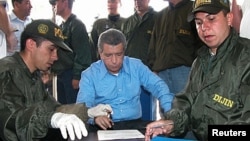The United States on Thursday dropped almost all remaining sanctions on the Colombian Cali drug cartel in the single largest delisting in the history of the U.S. sanctions programs.
The Treasury Department said the action was taken following the sanctions-related financial collapse of the Colombia-based Cali cartel, in its heyday the world's most powerful drug trafficking organization.
“Today's action demonstrates the successful use of targeted sanctions, which have destroyed the Rodriguez Orejuela brothers' business empire,” Adam Szubin, the director of the Treasury's Office of Foreign Assets Control, said in a statement.
The two brothers were the leaders of the Cali cartel and are the only two who remain on the sanctions list as Colombian authorities finish confiscating all their assets. The brothers, Miguel and Gilberto Rodriguez Orejuela, are now serving jail terms in the United States.
In all, the United States lifted sanctions on 78 persons and 230 entities with ties to the cartel. The sanctions had frozen any assets these people and organizations may have held in the United States and prohibited U.S. businesses from dealing with them.
In Colombia, the sanctions also exerted a powerful influence on local businesses, who strived to avoid ties to illicit finance. Getting on the U.S. sanctions list was akin to a “civic death,” according to a senior Treasury official.
Later, the power of the sanctions was also bolstered by the cooperation of Colombian law enforcement, which aggressively confiscated the cartel's assets.
“I don't know that sanctions in a different environment have quite the same impact,” said the senior official, who spoke to reporters on condition of anonymity.
The delisting also bolsters Treasury's argument that sanctions are meant to change behavior, not simply punish bad actors. Treasury delisted those with prior ties to the Cali cartel who promised to sever ties to drug trafficking and return illegal assets.
In all, more than 800 people and companies have been deleted from Treasury's sanctions list since 2012. That compares to about 1,300 new people and companies added to the list in that time.
The Treasury Department said the action was taken following the sanctions-related financial collapse of the Colombia-based Cali cartel, in its heyday the world's most powerful drug trafficking organization.
“Today's action demonstrates the successful use of targeted sanctions, which have destroyed the Rodriguez Orejuela brothers' business empire,” Adam Szubin, the director of the Treasury's Office of Foreign Assets Control, said in a statement.
The two brothers were the leaders of the Cali cartel and are the only two who remain on the sanctions list as Colombian authorities finish confiscating all their assets. The brothers, Miguel and Gilberto Rodriguez Orejuela, are now serving jail terms in the United States.
In all, the United States lifted sanctions on 78 persons and 230 entities with ties to the cartel. The sanctions had frozen any assets these people and organizations may have held in the United States and prohibited U.S. businesses from dealing with them.
In Colombia, the sanctions also exerted a powerful influence on local businesses, who strived to avoid ties to illicit finance. Getting on the U.S. sanctions list was akin to a “civic death,” according to a senior Treasury official.
Later, the power of the sanctions was also bolstered by the cooperation of Colombian law enforcement, which aggressively confiscated the cartel's assets.
“I don't know that sanctions in a different environment have quite the same impact,” said the senior official, who spoke to reporters on condition of anonymity.
The delisting also bolsters Treasury's argument that sanctions are meant to change behavior, not simply punish bad actors. Treasury delisted those with prior ties to the Cali cartel who promised to sever ties to drug trafficking and return illegal assets.
In all, more than 800 people and companies have been deleted from Treasury's sanctions list since 2012. That compares to about 1,300 new people and companies added to the list in that time.





